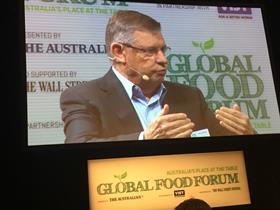
Disruption is coming and a paradigm shift is needed for Australia’s agribusinesses to succeed.
That’s according to industry leaders who spoke at The Australian's Global Food Forum in Melbourne on 28 March.
Harry Debney, CEO of leading Australian horticulture company Costa Group, said finding a way to mechanise harvest is the “holy grail” for the horticulture industry.
“We talk about Australia being a major exporter – and it is in beef and wheat, but it’s not so in horticulture – we’re still a niche exporter,” Debney said. “If we could mechanise most of our harvest, which is 30-50 per cent of our total production cost, we would be global exporter on a very large scale.”
Debney said one the major steps forward in technology was the development of sorting lines that detect colour and blemishes on fruit. Costa is trialling Compac’s new vision sorting equipment which checks each piece of fruit 100 times, up from its previous sorting line technology, which checked fruit around seven times before being sorted manually.
“This is a real game changer,” Debney said. “It eliminates all of the labour [to sort fruit], and has given us 50 per cent throughput improvement.
“The challenge is, how can we marry this new computer power of vision systems to the mechanical [harvest] process and nail it? If we can do it that, we’ve changed the whole game.”
Sam Trethewey, general manager of agriculture start-up SproutX, said technology would be the greatest enabler to maintaining Australia’s competitiveness as other nations improve their food production standards.
Using the example of an app being trialled on farms in the Goulburn Valley and Tasmania that tracks the quality of fruit being packed by each picker and boosts packout rates, he said even simple apps or technologies can improve efficiency and quality.
“Disruption is going to happen, it’s how we embrace it that will affect our businesses,” he said.
Growers hungry for tech
Australian growers’ appetite for new technology has never been stronger, according to a new study funded by grower-owned body Horticulture Innovation Australia (Hort Innovation) and conducted by the Queensland Department of Agriculture and Fisheries.
The study evaluated growers’ needs for mechanisation, automation, robotics and sensing technology and the potential for these new technologies to be applied.
Hort Innovation CEO John Lloyd said the study found colour vision graders and GPS guidance technology had already been adapted by growers, with “growers also hugely positive about the benefits that innovations in automation, robotics and sensing could bring”.
“Cost pressures, labour issues and the need to find efficiencies are driving these changes, with better water efficiency, reducing environmental impacts, more flexible management and market and product diversification also playing a role,” Lloyd said.
James Whiteside, CEO of vegetable industry body Ausveg, said these technologies were just some of the “tremendous opportunities for vegetable growers to improve their productivity and profitability by utilising current and future R&D”.
“It also offers the best, most sustainable solution to the industry’s biggest challenge of finding a suitably sized and skilled labour force to pick and pack a range of different crops and products,” Whiteside said.
A full interview with Costa CEO Harry Debney features in the autumn edition of Produce Plus, out now



